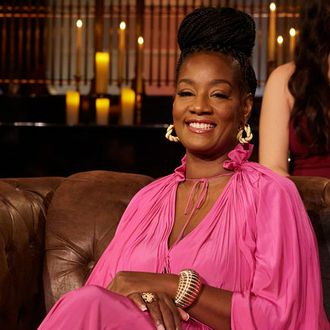
One thing defined the debut season of the U.S. version of The Traitors, and it wasn’t Kate Chastain’s incredible temper tantrums or Christian’s bonkers, focus-pulling way of existing. It was the emotions that poured out of everybody, all the time, as the season hurtled toward its endgame. Beginning with the Shelbe vote-off in second half of the game, the emotional stakes heightened with each elimination, capping off with a tour de force betrayal when Cirie Fields eliminated Arie, her closest traitor ally. She convinced the other players that he didn’t need the money so that her own faithful allies wouldn’t suspect her — using their need to support their growing families as implicit collateral. Cirie, an assigned traitor, then took the money for herself and ran. It was both thrilling and heartbreaking to see her faithful allies, Andie and Quentin, fully believe in Cirie before having their hopes dashed when they realized they’d been played. The two were torn up by both their loss and the methods their ally used to accomplish her win — shocked, teary-eyed, and emotionally destroyed by the realization that the person they “knew” they could trust was acting all along. At The Traitors’ reunion, which debuted yesterday on Peacock, the final players debated that fateful move, and the emotions returned.
Andie and Quentin argued that Cirie over-stepped an ethical code by bringing their families’ need for money and Andie’s expenses for top surgery into the game. But Cirie, though deferential to their emotions, said she did what she had to do with the card she was dealt: being named a traitor. “I felt like Cirie stabbed me in the back by being a traitor,” Quentin says at one point, ascribing to Cirie a moral failing over a role she had no control over. He then follows up with a more coherent argument: “Ultimately, in using my life to get Arie to quit in reference to my kids, she stabbed me in the chest.” His moral code for what was kosher in a game of deception was different from Cirie’s and it cost him the win.
These ethical dilemmas regarding players’ personal lives and feelings aren’t new to strategy-based reality TV — they’ve been around since Richard Hatch created Survivor’s very first alliance back in season one. But what are the ethics of a game that has few set-in-stone rules about gameplay? On Survivor, a series about to embark on its 44th season, that’s been thoroughly litigated. Varner outing Zeke as transgender resulted in his elimination; Dan touching Kellee in a way that made her feel uncomfortable didn’t result in his, though the show knows it should have, since he was later removed for inappropriately touching a member of the show’s production team. Tony promising loyalty on the lives of his kids, meanwhile, was a winning move in season 28. By this stage in Survivor’s lifecycle, the ethics are understood. That Cirie’s Traitors moves were conducted within a moral grey area and resulted in hurt feelings is typical for a first season. Moves like Cirie and Tony’s make strategy shows work, not in spite of the emotions they bring up but because of them. They’re completely separate from Varner’s transphobia and Dan’s predatory behavior — both despicable and disgusting enough to nearly ruin an entire season of the show.
It’s especially interesting to see Cirie wrapped up in all this. A four-time Survivor vet, her moral compass has been shaped by her time on strategy shows, and at the end of the reunion, she spoke from that experience. “If you guys ever play these games again, there are gonna be ups and downs, but the relationships that are formed, for me, in these games, and this is particularly to you, Andie — our relationship was so real to me,” she says. “It had nothing to do with The Traitors.” It’s true, unequivocally, that part of the reason Andie trusted Cirie was that they had shared part of their life with her. It’s also true that, if their places were swapped, Cirie would’ve still been capable of believing the person she shared her story with was a traitor. Whether or not she should hold Andie and Quentin to her standard of gameplay is not the question; the question is about the ethics of the boundaries Cirie was willing to cross to earn the money, and whether Andie and Quentin have a right to be hurt by the weaponization of their outside lives inside the game.
The emotions endemic to this season of The Traitors were a large part of what made it such a gripping success for Peacock. Over on Survivor, contestants are now honored to be outplayed and those who aren’t are labeled sore losers. It’s exciting to see a show in such a nascent stage that the social rules have not been hammered out, and thrilling to see people get mad not only that they lost, but about the way in which they lost. Next season, it’s likely that all participants will come into The Traitors with something close to Cirie’s mindset, if not her skillset. The second season of Survivor included alliances without any contestants questioning the morality of strategizing. It was what needed to be done. Anyone can be a traitor, even the person you poured your heart out to. In turn, the show will need to innovate on those terms to stay interesting. The value of the first season of The Traitors came in part from its ability to return the audience to that naïve state of early strategy shows — when questions of morality, and intense emotions, are still interesting and viable. There are no easy answers for what Cirie did. But the truth remains: She won.


